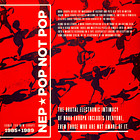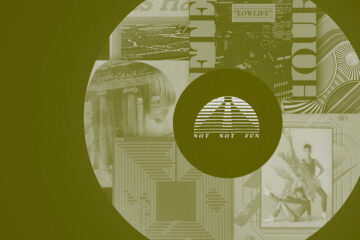When Leri Ahel and Željko Luketić founded Fox & His Friends, their mission was clear: The Croatian label was intended to serve as a platform for the wealth of music made in the Socialist Federal Republic of Yugoslavia (SFRY), a non-aligned state that emerged after World War II—countries that, during the Cold War, neither sided with the capitalist West nor the socialist Eastern Bloc—and fell apart in the early 1990s.
The label’s first release was a carefully edited reissue of the soundtrack to the 1981 Yugoslav sci-fi movie Visitors from the Arkana Galaxy by prolific, Oscar-winning composer Tomislav Simović. This was followed by a reissue of the underground synth-pop cult hit »Decadance« by the Zagreb-based collective NEP, and the compilation Sex, Crime & Politics (Cinematic Disco, Jazz & Electronica from Yugoslavia 1974–1984) by the Yugoslav »King of Musical« Alfi Kabiljo.

However, the two DJs, who have curated several exhibitions on Yugoslav music and cultural history, gave their project a somewhat counter-intuitive name: Fox and His Friends (Faustrecht der Freiheit in German) is a 1975 film by director Rainer Werner Fassbinder about the tribulations of a gay showman in the German Federal Republic. »He is our favourite director who examined the German mainstream from the position of an outsider,« explains Luketić. »Similarly, we question the ex-Yu mainstream from the position of an outsider label and dig through layers of mainstream concrete.«
Somewhat ironically, the name’s similarity to the right-wing US morning show Fox & Friends occasionally yields serendipitous results for the two. »We seem to have a lot of fans in the US, because we get tagged on Twitter all the time,« quips Ahel. »It doesn’t help the sales though.«
In-Depth Cultural Research
The two also cite Fassbinder’s work ethic as an inspiration for what they do. Indeed, Fox & His Friends releases stand out from a sea of—often bootlegged—reissues that do very little to contextualise the music. »A Croatian newspaper called Fox & His Friends a ›label that does in-depth cultural research‹,« notes Željko Luketić, a PhD candidate who has conducted extensive research on Yugoslav music and culture alongside his work as a music and film critic
The label’s inaugural release, he explains, took three years to complete. Beyond that, the extensive stand-out compilation Socialist Disco. Dancing Behind Yugoslavia’s Velvet Curtain 1977–1987, as well as the release of Prizma, a previously lost electronic prog album from 1985 by Nenad Vilović—rejected by all of the state-owned labels that the prolific producer and multi-instrumentalist contacted at the time—attest to the fact that Fox & His Friends is not your usual reissue label.
»A Croatian newspaper called Fox & His Friends a ›label that does in-depth cultural research‹«.
Željko Luketić (Fox & His Friends)
Recent years have seen a renewed interest in Yugoslav music, which has led to bootleg labels capitalising on the trend with a deluge of cheaply produced, unlicensed records. Much like the Belgrade-based Discom, Fox & His Friends ensure that all their records are properly licensed and remastered from the original tapes for publication. However, the disintegration of the SFRY created a plethora of difficulties for diligent reissue label owners.
Firstly, the formerly state-owned labels such as the biggest player Jugoton—somewhat metaphorically renamed Croatia—were either privatised or, like Diskoton, completely ceased to exist. Secondly, the end of the SFRY was followed by a decade of brutal wars, which meant that many of the master tapes were lost. »Diskoton’s archives were mostly destroyed in the bombing of Sarajevo during the 1990s. It’s devastating,« says Luketić. Hence, the first Socialist Disco compilation—a second one is in the works—draws exclusively from the Jugoton catalogue.
Context Over Content
Despite these obvious limitations, Socialist Disco best represents Fox & His Friends’ dedication to approaching even mainstream music from an outsider’s perspective. Based on a 2015 exhibition series curated by the two, it is meant to »acknowledge the emancipatory character« of a style of music that put women in the spotlight and attracted ethnic minorities as well as the LGBTQ community of the SFRY. »That’s why we open the record with a cover of the queer anthem ›I Will Survive,‹ performed by Zdenka Vučković,« says Luketić, who contributed extensive liner notes to the release.
It is indicative of his and Ahel’s broad tastes and interests that such a record would fit seamlessly alongside compilations such as All and Nothing at All (Film and Theatre Music 1978–1988), dedicated to the work of Metak member Mirko Krstičević, or The Breakwar by the Data off-shoot The Master Scratch Band—the first Yugoslav hip-hop project.

All And Nothing At All - Film And Theatre Music 1978 - 1988

Yu Aerobic (Original Workout Music From Yugoslavia 1981-1984)

The Zagreb School Of Animated Film

Pop Not Pop Songs For New Europe 1985-1989
By putting such releases properly into their contexts instead of treating them as mere content for the reissue market, Fox & His Friends facilitate broader discussions around Yugoslav culture and its connections to the rest of the world. Next up is Ozren Depolo’s soundtrack to the 1984 film Early Frost in Munich by director Bogdan Žižić, which follows a Yugoslav man who moved to the Federal Republic of Germany as one of the hundreds of thousands of Yugoslav »guest workers« whose stories have barely ever reached the German mainstream.
In the meantime, remix projects such as Visitors From The Galaxy Revisited, which saw artists like Anatolian Weapon and Drvg Cvltvre rework Tomislav Simović’s music, make it clear that Ahel and Luketić do not limit themselves to digging into the past. Fox & His Friends can and will also be a platform for today’s unconventional music. The overall mission might have changed; the loyalty to the outsider perspective has persevered.









